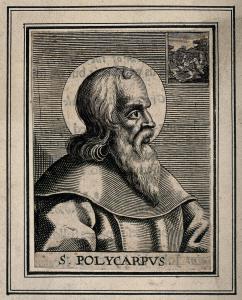
Trinitarians have scoured the writings of church fathers and seized upon certain portions in them to show that those authors believed Jesus was God. Of course, this is well known of Nicene and post-Nicene fathers because the Catholic Church determined in 325 at its Nicene Council that Jesus was “very God of very God.” This meant that Jesus was just as much God as God the Father was, thus making Jesus equal in deity with the Father. But it is more notable when ante-Nicene church fathers wrote that Jesus is “God,” especially those who lived the earliest, such as in the late first century and/or second century. Such was the venerable Polycarp.
The Life of Polycarp
Polycarp (b. 69—d. c.155) was bishop of Smyrna in Greece. According to tradition, he was a Christian martyr who was burnt at the stake. Church fathers Irenaeus (b. c.120—d. c.200) and Tertullian (b. 160—d. 240) wrote that Polycarp was a disciple of the apostle John, who was one of Jesus’ twelve apostles. Irenaeus adds that Polycarp was a friend of Papias, who was another “hearer of John.” Plus, Irenaeus wrote that he knew Polycarp in his later years. Jerome (b. 327—d. 420)—the compiler of the Latin Vulgate—also wrote that Polycarp knew the apostle John, adding that John ordained Polycarp as bishop of Smyrna. (However, there is some doubt that Polycarp advocated the office of bishop since he did not use that term.)
The One Extant Letter of Polycarp
The only writing of Polycarp that has survived is his Epistle of Polycarp to the Philippians. Scholars often designate it simply as the Letter to the Philippians. Some Trinitarians cite two words in Latin manuscripts of it as proof that Polycarp believed Jesus was “God.” These two words are et deum, meaning “and God,” in the phrase dominum nostrum et deum Iesum Christum (Phil. 12.2), which is translated “believe in our Lord and God Jesus Christ.”
J. B. Lightfoot, an expert on the earliest writings of church fathers, pointed out that all the Latin manuscripts of Polycarp’s Letter to the Philippians were written between the ninth and sixteenth centuries. That is much later than the Greek manuscripts from which it is believed these Latin manuscripts were translated. And when it comes to manuscripts of ancient documents, earlier manuscripts tend to be more historically authentic than those written later. The reason is that the scribal profession, which preceded the printing press that was invented in 1440, was subject to increasing error in time.
Polycarp’s Letter Scrutinized
Not all Polycarp’s Letter to the Philippians has survived in earlier Greek manuscripts; but all of it has survived in later Latin manuscripts. The portion that contains the disputed phrase in which Polycarp is believed by some to have identified Jesus as “God” is not contained in any of the Greek manuscripts of this letter. Furthermore, all the Latin manuscripts of this letter do not contain the two words et deum in this questionable phrase. In fact, they are evenly divided between those that contain et deum in this phrase and those that do not contain et deum in it. Also, Lightfoot says the Latin manuscripts are “very loose” in their translations of the original Greek manuscripts and that even the latter are corrupted. Thus, Lightfoot deems et deum in this Latin phrase as possibly spurious.
Moreover, the entire remainder of Polycarp’s Letter to the Philippians does not have any other material that identifies Jesus as “God.” This admittedly contrasts with the writings of second century church fathers Ignatius, Irenaeus, and Justin Martyr who do repeatedly identify Jesus as “God,” though they do so while subscribing to Jesus having a lesser deity than that of God the Father. And in this letter by Polycarp, he constantly mentions “God and Christ,” distinguishing them and indicating that the Father is “God” while not also attributing the same to Jesus. Due to this evidence and the absence of et deum in the questionable phrase in some Latin manuscripts of his letter, it is doubtful the highly respected, apostolic church father Polycarp identified Jesus as “God” in this single, extant writing known as the Epistle of Polycarp to the Philippians.













